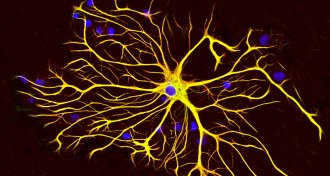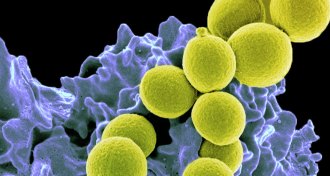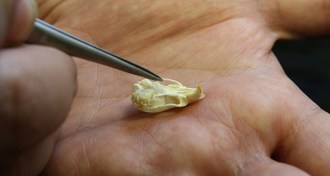
Bethany Brookshire
Bethany Brookshire was the staff writer at Science News for Students from 2013 to 2021. She has a B.S. in biology and a B.A. in philosophy from The College of William and Mary, and a Ph.D. in physiology and pharmacology from Wake Forest University School of Medicine. She is also a host on the podcast Science for the People, and a 2019-2020 MIT Knight Science Journalism Fellow.

Trustworthy journalism comes at a price.
Scientists and journalists share a core belief in questioning, observing and verifying to reach the truth. Science News reports on crucial research and discovery across science disciplines. We need your financial support to make it happen – every contribution makes a difference.
All Stories by Bethany Brookshire
-
 Humans
Humans50 years ago, folate deficiency was linked to birth defects
50 years ago, scientists found that a lack of folic acid in pregnant women could cause birth defects. But now, how much is too much?
-
 Neuroscience
NeuroscienceThe brain’s helper cells have a hand in learning fear
After a traumatic experience, rat brains release inflammatory signals that come from astrocytes, suggesting a new role for the brain’s “helper” cells.
-
 Psychology
PsychologyWhether psychology research is improving depends on whom you ask
Psychologists are pessimistic about the state of their field but want to improve, a survey shows. But are new measures working?
-
 Tech
Tech50 years ago, engineers tried catching commercial planes in nets
Fifty years ago, aviation experts tried helping commercial aircraft come to a stop during landing by catching them in massive nets. The idea crash-landed for commercial flights, but it’s still used in the military.
-
 Genetics
GeneticsTwo artificial sweeteners together take the bitter out of bittersweet
Some artificial sweeteners are well known for their bitter aftertastes. But saccharin and cyclamate are better together, and now scientists know why.
-
 Tech
Tech50 years ago, West Germany embraced nuclear power
In 1967, Germany gave nuclear power a try. Today, the country is trading nukes for renewables.
-
 Animals
AnimalsThis sea snake looks like a banana and hunts like a Slinky
A newly identified sea snake subspecies is known to live in a single gulf off the Pacific coast of Costa Rica.
-
 Science & Society
Science & SocietyOn social media, privacy is no longer a personal choice
Data from the now-defunct social platform Friendster show that even people not on social media have predictable qualities.
-
 Health & Medicine
Health & Medicine50 years ago, antibiotic resistance alarms went unheeded
Scientists have worried about antibiotic resistance for decades.
-
 Health & Medicine
Health & MedicineResearchers stumble onto a new role for breast cancer drug
At first, ophthalmologist Xu Wang thought her experiment had failed. But instead, she revealed a new role for the breast cancer drug tamoxifen — protection from eye injury.
-
 Psychology
PsychologyRunning is contagious among those with the competitive bug
Can behaviors really be contagious? Runners log more miles when their friends do — especially if they want to stay leader of the pack, a new study finds.
-
 Archaeology
ArchaeologyHow the house mouse tamed itself
When people began to settle down, animals followed. Some made successful auditions as our domesticated species. Others — like mice — became our vermin, a new study shows.